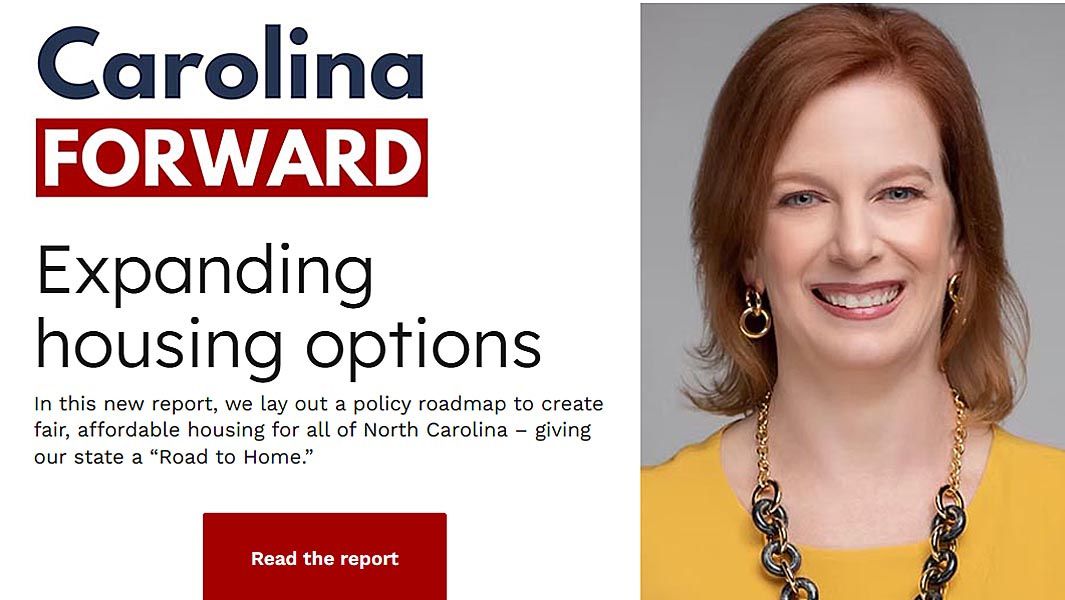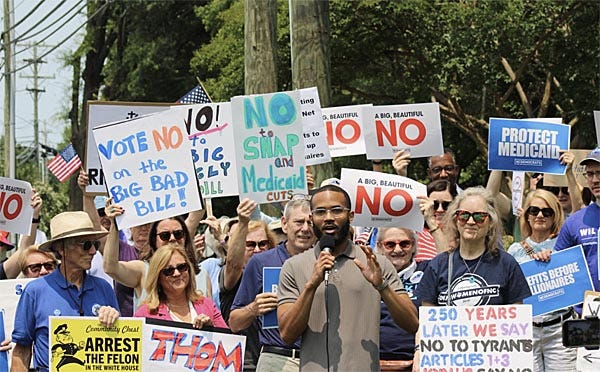Four Messaging Experts on How to Resist the Assault on our Democracy
Working advice from Heather Cox Richardson, Nicole Quick of Carolina Forward, George Lakoff, and Thomas Mills of Politics NC
Several years ago Heather Cox Richardson told her Politics Chats viewers that we have the power to change the national narrative. She did not say to put our own spin on American events; she said to tell the truth every chance we get.
The fact was that we were drowning in Republican/MAGA lies.
In 2017 Trump insisted his Inaugural crowd was “a million, a million and a half people,” even after the official count was 250,000. I was stunned. First, that someone would tell so obvious a lie. Second, because so many people believed the lie. Why?
Eight and a half years later, he’s still lying — and I’m still stunned. Recently, Richardson wrote about Trump’s “emergency” armed takeover of Washington DC in the name of citizens’ safety. He said that crime there is “much higher than the worst place on Earth.” Richardson wrote that his claim is not supported by facts. Violent crime there is at a 30-year low.
Why do about 40% of Americans still believe the lie? (I’m unnerved by this approval rating.)
I’ve never been able to figure out why so many people believe his and his confederates’ lies in the face of obvious facts.
Never — until last week, when I attended a talk on effective messaging in Asheville, NC.
The speaker was Nicole Quick from Carolina Forward, which was founded in 2020 to challenge conservative domination of political messaging in North Carolina. The website says, “We believe in reclaiming the language of morality in public policy.” In support of this, they conduct “some of North Carolina’s best regular opinion polling research.”

In her talk, Quick said that political messaging is a cultural process, not a statement of facts. For example, in the 2024 election conservatives won young male voters because they spoke to them through media like the Joe Rogan Experience, thereby creating a cultural presence that young men relate to. Progressive candidates must do the same.
Despite the spin of Republican policies, the reality is that in Western North Carolina they are hurting people. They are quickly raising the cost of daily life, of health and child care, of housing.

It’s our job to talk about that pain, everywhere and in our own clear, simple terms.
In my county last week, a resident publicly complained to commissioners about his new “property tax assessment”, that will result in a higher tax bill. His “27-year-old mobile home increased in value from $4.590 last year to $68,223 this year.” Another resident said her 1985 mobile home increased in value from $1,610 to $36,754; that’s 1561.74 percent!
I believe it’s our job as Democrats to support the two citizens who spoke out, and to amplify the issue every way we can. Instead of talking about “taxes” (which commissioners can shrug off), we can talk about commissioners’ cruelty to the human beings they serve. How about a billboard?
But why do those most likely to suffer from Republican policies refuse to look at alternatives like progressive policies?
Quick said that, for one example, for decades conservatives have hammered in the American myth that anyone will succeed in life if they work hard; to fail at this proves that a person is lazy and undeserving. So, for conservatives, it’s deeply correct to believe that “social programs” are morally wrong — even when someone in their family has government benefits.
Some might not even associate these programs with government. I remember a person saying in a public meeting, “Tell the government to keep their hands off my Medicare!”
To learn the difference between the left and right framing of political issues, Nicole Quick recommended reading George Lakoff's book, Don’t Think of An Elephant. She said “the most important thing to take away from this book is that voters don’t respond to facts; they respond to values.”

I would add to Lakoff’s quote above that we are in a crisis today where Democrats must confidently call out the specific, horrific effects of Republican repression.
Last week Thomas Mills wrote,
Who cares what Democrats stand for? They should all be standing against this insanity. Democrats should amplify every negative thing that pops up during the news cycle.
We must also nurture our own sanity, our own positive spirit.
This January, George Lakoff encouraged Americans to keep democracy alive. He posted:
Be Brave. Avoid helpless/hopeless talk. Authoritarians want you to feel powerless because it makes their work easier. Courage, faith, and optimism are essential. Fascism feeds on cynicism and pessimism. Starve it.
Here in North Carolina, Nicole Quick said we have reasons for optimism. We are not alone; there are millions of supporters of democracy in our state, regardless of political affiliation. We share the same everyday concerns.
[And] we can address those concerns using our own messaging, not by reacting to and reinforcing conservative messaging.
I believe that our own clear, real-life, personal, emotional messaging has a chance to influence voters we meet who are not yet quite committed to voting for change.




